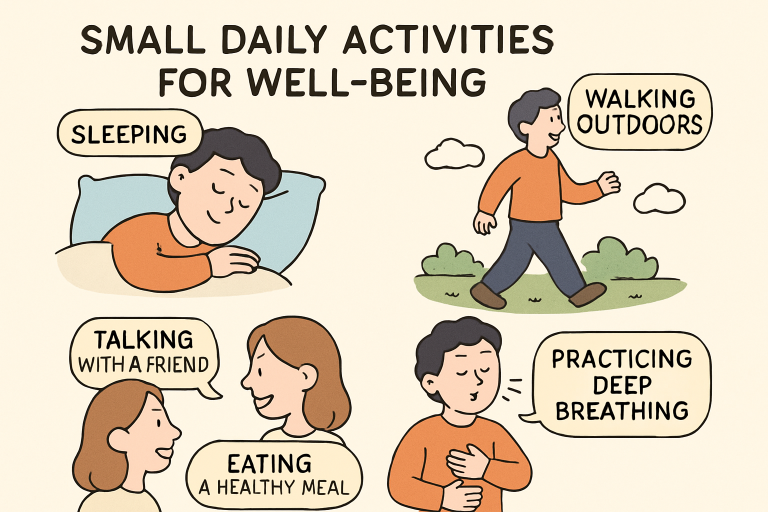Why Everyday Choices Matter
Mental health is an essential part of living a happy and fulfilled life. The choices you make each day—how you spend your time, the habits you form, and whom you connect with—have a genuine influence on your mental well-being. Data from the World Health Organization underscores this, revealing that nearly one in eight people worldwide live with a mental health disorder. Instead of searching for overnight solutions, focusing on steady, positive improvements can provide long-term resilience. Whether you’re seeking support for yourself or loved ones, simply adding one uplifting habit at a time can make a noticeable difference.
Sometimes, extra support is needed. If you find yourself in need of professional guidance to manage life’s challenges, Counseling West Bloomfield offers experienced therapists devoted to helping individuals foster emotional health and navigate personal difficulties. Reaching out for support can be a transformative step and reflects true strength.
Prioritizing Restful Sleep
Achieving restful, quality sleep is vital for your mind and body. The American Academy of Sleep Medicine recommends adults aim for seven to nine hours per night, but it’s not just about quantity. Routine and environment play an important role. Try to wind down at the same time every evening, keep your room dark and cool, and limit electronics before bed. According to the Sleep Foundation, poor sleep can impair concentration, heighten irritability, and even increase the risk of mental health issues such as depression and anxiety. Small adjustments to your nightly rituals can create meaningful changes over time.
Move Your Body, Brighten Your Mind
Regular physical activity is widely recognized as one of the best habits for mental well-being. Even a modest 30-minute walk can dramatically lift your mood. Movement increases the release of endorphins and reduces stress hormones. The good news? You don’t need a rigorous gym routine to benefit. Gardening, dancing in your kitchen, or a brisk walk with the dog all serve as excellent ways to keep active. The primary goal is consistency—fitting activity into your life a little bit every day helps reduce symptoms of anxiety and depression. The Harvard Health Blog highlights how even light to moderate exercise can reduce emotional distress and increase overall mental resilience.
The Power of Social Connections
Strong social bonds act as a buffer against stress, decreasing the risk of mental health struggles. Reaching out for a chat, sharing laughter with a friend, or participating in a community activity can significantly enhance your sense of belonging and happiness. Whether your connections are virtual or face-to-face, nurturing them strengthens your emotional safety net. According to tips from NIH’s wellness resources, positive relationships can support not only improved mental health but also bolster your immune response to illness. Even brief everyday interactions, like a warm text or a five-minute video call, matter.

Balancing Daily Stressors
Managing everyday stress is crucial for maintaining mental health. While stress is inevitable, chronic, unmanaged stress can erode your well-being over time. Simple relaxation strategies—such as deep breathing exercises, writing about your experiences, or a meditative stroll outside—help keep your nervous system in balance. The CDC recommends identifying your most persistent stressors and practicing boundaries by saying “no” when necessary. Purposefully setting aside time for rewarding or creative activities, no matter how brief, helps restore your inner resources and renew motivation.
Nourish Your Body, Fuel Your Mind
The impact of nutrition on mental health is stronger than ever. Eating a balanced diet that includes omega-3 fatty acids, leafy greens, colorful vegetables, and whole grains can boost both mood and concentration levels. Science in the field of nutritional psychiatry highlights how deficiencies in certain nutrients—like B-vitamins or healthy fats—may increase your risk of experiencing depression. Staying hydrated is equally important: even mild dehydration can reduce your attention span and make emotions feel overwhelming. When possible, prepare simple, whole-food meals and reach for water instead of sugary beverages for optimal cognitive function.
Asking for Help Strengthens, Not Weakens
Everyone experiences difficult periods, and sometimes, professional support is the healthiest response. Checking in with a qualified counselor or therapist provides a confidential space to address persistent worries or cope with change. Reaching out for help is a sign of courage, not weakness, and normalizing this can support a stronger community overall. Hotlines, school counselors, and local support groups also provide accessible entry points for those seeking to start their healing journey.
Building a Resilient Routine
The most impactful growth comes from small habits added up over time. Embracing consistency in your self-care—whether that means starting each day with gratitude, stepping outside for fresh air, or creating evening wind-down rituals—builds lasting emotional resilience. These habits don’t require perfection, just gradual commitment. Remember, every positive step you take is a meaningful one, contributing to a stronger, more balanced mind that can navigate life’s ups and downs with greater ease.












